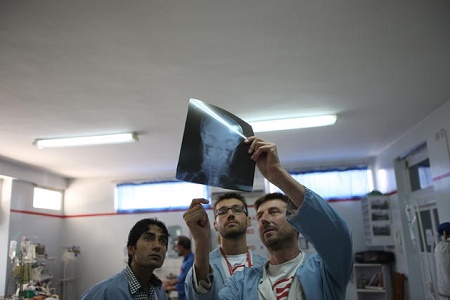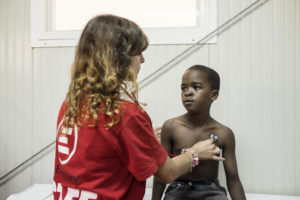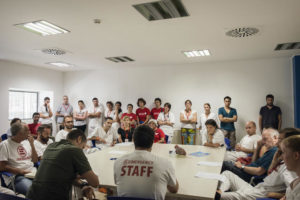Die wichtigsten Themen
Important facts
This role requires the complete and autonomous management of orthopaedic and trauma surgical procedures, and of orthopaedic out-patients. You will share the management of polytrauma patients with the General Surgeon, and cooperate with all the health personnel (doctors, nurses and physiotherapist) in the care of patients admitted to the hospital.
Background and organisation of work
The international Orthopaedic and Trauma Surgeon will work as part of a team of international specialists – experts or in training – organising and carrying out the training of the local medical and health care staff in his/her area of responsibility. He/she will work in collaboration with the international Physiotherapist – where present – in the physiotherapy care plan and the management of plaster casts. In the absence of an international Physiotherapist, he/she will also supervise the work of the national physiotherapists.
He/she is responsible to the Medical Coordinator, who is in charge of the management and organisation of the project.
The main areas of work are:
- OPERATING THEATRES: 2-3 operating theatres for General Surgery (Emergency and Elective) and Orthopaedic Trauma Surgery based on the admissions criteria of the Centre;
- WARDS: 3-4 wards comprising a maximum of 120 beds.
The Orthopaedic and Trauma Surgeon is usually present in the hospital from 08 till 16, but is on-call 24/7 in case of emergency (including possible Mass Casualties). Daily activity includes ward round, clinic, work in the Emergency Department and Operating Theatres. The team is completed by local and international Operating Theatre specialists – Anaesthetist, Anaesthetic Technicians, Theatre Nurses.
Duties and Reponsiblities
All EMERGENCY international staff is expected to know and follow the hospital admissions criteria, guidelines, protocols, and the diagnosis and treatment standards in use in the Centre, and to ensure the correct compilation of clinical records and statistics in both computer and paper formats.
The main duties and responsibilities of the international Orthopaedic and Trauma Surgeon are:
- evaluation of orthopaedic patients and their respective treatment options;
- management of orthopaedic trauma surgical procedures;
- assistance in the clinical care management of orthopaedic patients;
- to supervise and participate in the orthopaedic outpatients clinic;
- assisting in clinical research and record keeping as required by the scientific programmes of the specialist sector of the Medical Division of EMERGENCY.
Clinical activity and decisions regarding patient treatment must always be discussed and shared with the Medical Coordinator, national and international medical and surgical colleagues, and the national and international nursing personnel.
Management of supply orders
The Orthopaedic and Trauma Surgeon is responsible for checking the provision of orthopaedic surgical instruments and equipment, and informing the Medical Coordinator of any requirements.
Management and training of local personnel
Clinical activities and patient care are always carried out alongside and in collaboration with local personnel, who thus benefit from training in the field. There is also provision for more specific teaching activities, managed by the international specialists, in accordance with the clinical protocols in use and as agreed with the Medical Coordinator.
 Caseload and equipment
Caseload and equipment
The caseload varies according to the project, but the main orthopaedic pathologies encountered are:
- open and closed fractures;
- osteomyelitis (only for patients already treated);
- delayed union and pseudoarthrosis;
- reconstructive plastic surgery (Skin grafts and muscle and/or fasciocutaneous flaps);
- surgery for vascular injuries of the limbs (blood vessel repair and vein grafts).
SURGICAL CENTRE – Kabul, Afghanistan
The Surgical Centre in Kabul is today the most important centre for war surgery in the Country. The Intensive Care Unit has 7 beds with monitoring systems and ventilators.
CT scanning equipment is available. Both paediatric and adult patients are treated. Around 20% of patients are under 14 years of age, and present with bullet injuries, shrapnel, landmine injuries, stab wounds and burns. Abdominal, vascular, orthopaedic trauma, plastic, thoracic, maxillofacial, ocular and neurosurgical interventions are carried out both electively and in emergency.
SURGICAL CENTRE – Lashkar-gah, Afghanistan
This is the only specialist war surgery centre in the region. The Intensive Care Unit has six beds with monitoring equipment. The admissions criteria and therefore the caseload are similar to those in Kabul, but with a higher prevalence of paediatric patients.
COMPLEXE PÉDIATRIQUE – Central African Republic, Bangui
Following the coup d’état that took place in late March 2013, an emergency team is working at the Complexe pédiatrique (the public paediatrics hospital) in Bangui. After having set two Operating Theatres up and running again, our doctors and nurses have started operating there, working on war- and non war-related surgery based on the most urgent needs of the local population.
SURGICAL AND PAEDIATRIC CENTRE – Goderich, Sierra Leone
Every day over 130 patients are treated at the Surgical and Paediatric Centre in Goderich. Over time the admissions criteria have been broadened in response to the needs of the population: today they include Traumatology, Emergency and Elective surgery (emergencies permitting). In 2012 an 8-bed Intensive Care Unit, guest quarters for relatives accompanying patients living far away from the Centre, and two new operating theatres were opened.
COMPLEXE PÉDIATRIQUE – Central African Republic, Bangui
Following the coup d’état that took place in late March 2013, an emergency team is working at the Complexe pédiatrique (the public paediatrics hospital) in Bangui. After having set two Operating Theatres up and running again, our doctors and nurses have started operating there, working on war- and non-war-related surgery based on the most urgent needs of the local population.
In all the Centres, every operating theatre is equipped with specific sets for the main orthopaedic and general surgical procedures. The orthopaedic operating theatres are all equipped with orthopaedic surgical operating tables; traction apparatus; mobile image intensifier (C-arm).
 Guidelines, Protocols and Equipment
Guidelines, Protocols and Equipment
Further information on the guidelines, protocols and clinical services relevant to the post along with details of the instruments and equipment available will be provided at interview and during the period of preparation for the mission.
Specific requirements
- Medical Degree, and current professional registration on the medical register of your Country of residence;
- specialisation in Orthopaedics and Traum;
- at least 5 years’ relevant hospital experience;
- hospital experience in the Trauma department would be an advantage.
Required availabilty
6 months’ overseas stay including a period of leave to be taken at the end of the mission in agreement with the coordinator. Shorter missions may only be considered for specific needs as defined by the organisation.
Are you interested?
If you are interested please write an e-mail to fo.recruiting@emergency.it.



